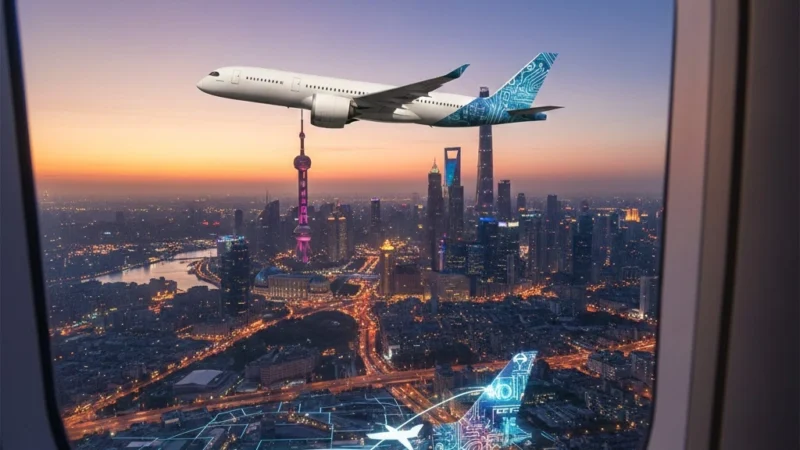Accelerating APAC Travel Flows – KL–Shanghai Network Assessment

Introduction
Kuala Lumpur International Airport (KLIA) is rapidly strengthening its role as a gateway between Southeast Asia and China. The KL–Shanghai route has become a key corridor, boosting tourism, business travel, and regional trade. This article provides an overview of airlines, ticket information, passenger trends, strategic implications, and answers key traveler questions.
KL–Shanghai Air Connectivity Overview
KLIA hosts 10 Chinese airlines, doubling its pre-pandemic presence. Key carriers on the KL–Shanghai route include:
| Airline | Route | Frequency | Aircraft |
|---|---|---|---|
| Juneyao Airlines | Shanghai Pudong (PVG) – KLIA | 4× weekly | Airbus A320 |
| China Eastern | Shanghai – KLIA | Daily | Airbus A330 |
| Hainan Airlines | Haikou – KLIA | 3× weekly | Boeing 787 |
| Loong Air | Xi’an – KLIA | 3× weekly | Airbus A320 |
This network provides both coastal and inland Chinese city links, improving passenger choice and fostering business and tourism growth.
Passenger Demand Trends
Recent trends highlight strong demand on the KL–Shanghai corridor:
- 3.9 million international passengers at KLIA in July 2025 (+10.3% MoM).
- 1.44 million Chinese arrivals from January–April 2025 (+37.8% YoY).
- Visa-free entry for Chinese nationals for 30 days continues to drive inbound tourism.
High load factors indicate robust business and leisure travel demand, confirming the route’s strategic importance.
Ticket Details
| Airline | Cabin Class | Average Fare (USD) | Booking Tips |
|---|---|---|---|
| Juneyao Airlines | Economy | 350–450 | Book 4–6 weeks in advance for best fares |
| China Eastern | Economy / Business | 380–520 / 950–1,200 | Flexible tickets available; check for promotions |
| Hainan Airlines | Economy / Premium | 360–480 / 1,000–1,300 | Early booking recommended; loyalty program points apply |
| Loong Air | Economy | 340–420 | Affordable fares; seasonal promotions available |
Booking Tips:
- Compare prices across airlines for similar flight times.
- Early morning or late-night flights may have lower fares.
- Check visa requirements and travel advisories before booking.
Strategic Implications for APAC Travel
KLIA as a Regional Hub
Expanded China connectivity positions Kuala Lumpur as a key transit hub linking Greater China with Southeast Asia and Australasia.
Tourism Growth Potential
Visa-free access and frequent flights enable Malaysia to capture growing Chinese tourism, supporting Visit Malaysia Year 2026 initiatives.
Trade & Business Enhancement
Frequent flights support business travel and cargo, strengthening Malaysia’s role in regional commerce and investment flows.
Challenges and Risks
- Overcapacity Risk: Potential underutilized seats if growth projections are overestimated.
- Operational Strain: Increased traffic requires robust terminal, customs, and immigration management.
- Regulatory Shifts: Visa policy changes could disrupt passenger flows.
- Regional Competition: Other hubs (Bangkok, Singapore, Hanoi) also target China–Southeast Asia transit flows.
Recommendations
- Expand KL–Shanghai frequency and explore secondary Chinese cities.
- Strengthen partnerships with Chinese carriers for codeshare and marketing.
- Leverage visa-free policies to attract more tourists.
- Enhance terminal infrastructure and cargo handling.
- Use data analytics to forecast demand and optimize scheduling.
Frequently Asked Questions (FAQ)
Q1: How long is the flight from Kuala Lumpur to Shanghai?
A: Direct flights typically take 5–6 hours, depending on airline and weather conditions.
Q2: Are there visa requirements for Chinese travelers?
A: Chinese nationals can enter Malaysia visa-free for up to 30 days, subject to policy updates.
Q3: Which airlines operate the KL–Shanghai route?
A: Major airlines include Juneyao Airlines, China Eastern, Hainan Airlines, and Loong Air.
Q4: What is the average ticket price?
A: Economy fares range from $340–$480 USD, while business or premium fares range from $950–$1,300 USD depending on the airline and season.
Q5: Can I book flexible tickets?
A: Yes, airlines like China Eastern and Hainan Airlines offer flexible and refundable tickets for business travelers.
Q6: Are there seasonal promotions?
A: Airlines often offer seasonal discounts during Chinese New Year, Golden Week, and Malaysia’s travel campaigns.
Conclusion
The KL–Shanghai air route highlights Kuala Lumpur’s growing importance in accelerating APAC travel flows. With expanding airline networks, strong passenger demand, supportive visa policies, and strategic infrastructure investments, KLIA is set to strengthen its role as a major hub for tourism, business, and trade between China and Southeast Asia.







Comments are closed.